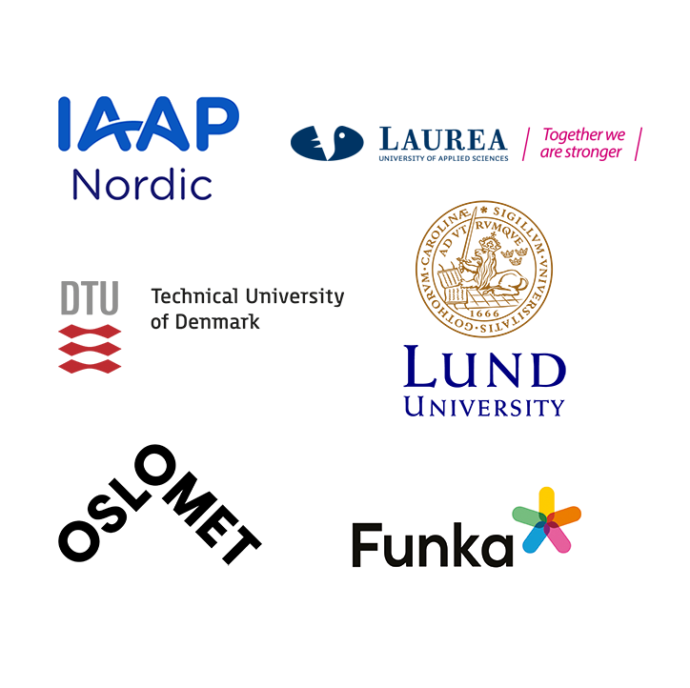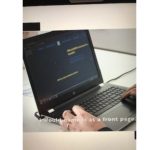
To promote Web Accessibility in Higher Education, Laurea has created practical web accessibility exercises and identified web accessibility modules that can be integrated in existing courses. These are also the main objectives in Web Accessibility in Higher Education –project.IAAP (The International Association of Accessibility Professionals) is joining forces with four leading universities in Sweden, Norway, Denmark and Finland (Laurea) as well as accessibility specialists company Funka Nu AB to set up a network to promote and strengthen web accessibility education throughout the Nordic countries. The two-year project takes a cross-sectoral approach involving higher education institutes, as well as non-profit and private sector providers of web accessibility training. Several workshops have been organized during the project to explore questions such as how web accessibility can be better integrated into existing curricula. This publication is a continuation of the previous accessibility publication: https://journal.laurea.fi/saavutettavuusosaaminen-korkeakouluissa/
Workshop in Finland

The web accessibility workshop was organized on 27th of May 2019 in Finland at Laurea University of Applied Sciences Tikkurila campus. There were 45 participants from different universities and professional accessibility companies and associations. The purpose of the workshop was to demonstrate how to implement web accessibility education to different study units and curriculum. IAAP project manager, Frida Sandberg told about the web accessibility survey results. After that Johanna Lahti and Terhi Kärpänen presented Laurea’s current structure of the study programs. Workshop main speakers were Janne Lahti and Tero Pesonen. Janne Lahti, part time lecturer and entrepreneur, told how he teach WCAG 2.1. Standard and web accessibility at Laurea. Tero Pesonen gave overview of different fields of accessibility. Based on his presentation, accessibility is not only technical accessibility (WCAG 2.1. standard), but also good design, content and usability.Laurea builds learning around a research- and development -oriented approach, which is called Learning by Developing (LbD). Learning and practical work go hand in hand. Based on this LbD-model, Laurea’s students participated to this project as well. Web accessibility projects were piloted in Service Design -study unit in spring 2019. Service design students from Business Information Technology program presented how they have learned accessibility in practice by showing a video on how they include visually impaired persons in testing Laurea University’s website. They had an opportunity to visit in Iris Centre (accessible training venue), and they conducted there web accessibility tests with visually impaired persons during the spring semester. Another Service Design students group organized the workshop and was responsible for holding the workshop for the participants.This workshop was really an eye-opener. Especially the video, made by students, showed how important it is to make web site and web services accessible for screen-reading program.Workshop feedback from participants was very positive:
“Thank you, it was great to see how accessibility is taken into account in studies and how students and companies co-operate in different projects!””The workshop and video was really good!”
What has been done in Finland?
What has been done to increase web accessibility in education in Finland?At Laurea University of Applied Sciences, there are now more web accessibility projects to students in different study units. At Laurea, learning is based on real-life projects and development assignments. Laurea builds learning around a research- and development -oriented approach (LbD). Real-life assignments, such as projects and development work, are a key element in all our fields of study. An increased number of web accessibility projects has also increased the importance and awareness of web accessibility. It has been important to include accessibility understanding to different study units. Accessibility comprises different fields such as technical compliance, usability and design, and cognition. It is also important to consider to use clear, proper language. After studying web accessibility in different projects and study units, student can continue with web accessibility subjects in their thesis work. Ideas and needs for thesis work often come from the same project partners.Laurea has also started co-operation with other universities. Currently Laurea is doing a pilot together with Haaga-Helia University of Applied Sciences (3AMK co-operation). The co-operation study unit name is: Accessibility Design (15 ECTS). Laurea will teach Service Design (10 ECTS) and Haaga-Helia’s course is Workplace Inclusion (5 ECTS). There are same students in each implementation, and they are going to get good understanding about accessibility during this course. During the course, students are doing different accessibility projects to companies. Students are testing a university web page, designing webinars for disabled people and testing and evaluating operational environment to make the environments accessible to all people, regardless of age, disability or other factors. In addition, there are visitors from different associations such as The Finnish Association on Intellectual and Developmental Disabilities (FAIDD) in the study-unit.However, more work needs to be done to increase accessibility knowledge in Finland. It is possible to add accessibility trainings to different study units, e.g. service design, digital marketing and user-center design studies. One way to increase the understanding is to set up a web accessibility online course for teachers, students and personnel.This is important especially for students who need to make sure that their final thesis is accessible.
Workshop in Sweden
The second web accessibility workshop was organized in Lund, Sweden at 20th of November 2019. The workshop was held at Ingvar Kamprad Designcentrum (IKDC) at Lund University. There were about 20 participants from different universities in Sweden and Denmark and from the project partner universities in Norway and Finland. The workshop was opened by the IAAP project manager Frida Sandberg, who also presented IAAP, the project and results of the survey conducted in the beginning of the project by the project partners.After that, two different cases were presented. Title of the first case was Universal Design for Learning, Being and Doing from Lund University. The second case was from Halmstad University and was titled: The role of design studio pedagogy in the teaching of accessibility. These cases presented how web accessibility is included in to different study programs in these universities, for example Design Thinking and design studies at Halmstad University.The workshop continued with a guest speaker from Handelsbanken, Accessibility Manager Nicklas Karlsson. He spoke about Private sectors need for trained personnel and addressed the need for continuous training about accessibility for existing staff in different private sector organizations. At the end there were group discussions about web accessibility importance and implementation in curriculum.
The final conference in Sweden
IAAP Nordic will host the final conference in Stockholm in autumn 2020 to present the insights, recommendations and good practice examples brought forward by the project Web Accessibility in Higher Education.Need more information about web accessibility: Information about the project